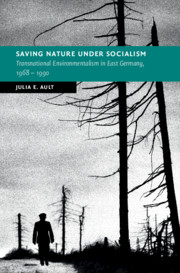‘A major contribution to the environmental history of socialist East Germany, showing the GDR as an ecological link, but also as an environmental hazard, to its neighbors. Ault traces the flow of pollution, people, ideas, and data through Central Europe, thereby highlighting the entanglements of environments and environmental activism during and after the Cold War.’
Astrid M. Eckert - author of West Germany and the Iron Curtain
‘Critical for any Europeanist, Saving Nature under Socialism uses environmentalism to demonstrate the importance of East German popular activism both with and against the state-as well as with and against grassroots politics across Cold War Europe. Julia Ault’s book is an important achievement on many terrains, and should be widely read.’
Belinda Davis - Rutgers University
‘For some years, East German historiography has been escaping the tired and limiting perspectives soldered into place by the misguided triumphalism of the 1990s. Focusing on the GDR's last two decades, on the seemingly unpromising ground of environmentalism, Julia Ault further deepens our grasp of this misperceived state-socialist project and its boundaries.’
Geoffrey Eley - University of Michigan
‘A thoroughly researched, well-written, and well-structured book, which provides interesting insights into the entanglements between the environment and the state in East Germany.’
Katja Doose
Source: Jahrbücher für Geschichte Osteuropas
‘Julia Ault demands we widen the lens beyond 1989 and the borders of the GDR. Ault argues that environmentalism and environmental thought had a longer and often contradictory history that dated back to the country’s founding … [this is] a comprehensive history of state and nonstate actors, laws, institutions, and ideas about nature in the GDR. Ault shows how environmental thought was not a Western import but had taken root prior to 1949 and then expanded and evolved over the next four decades.’
Thomas Fleischman
Source: Agricultural History



